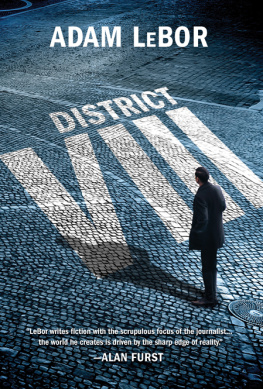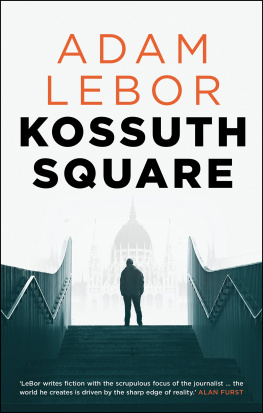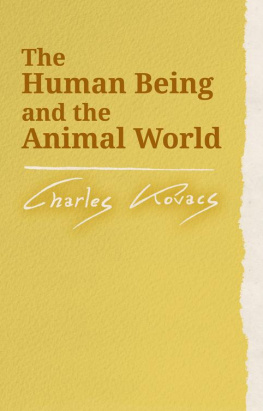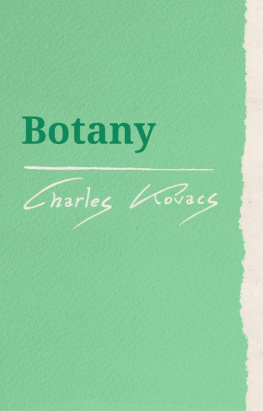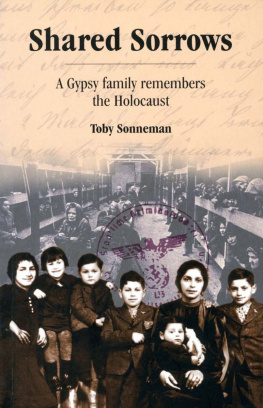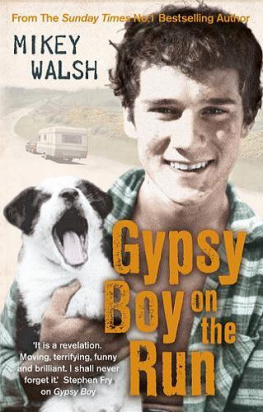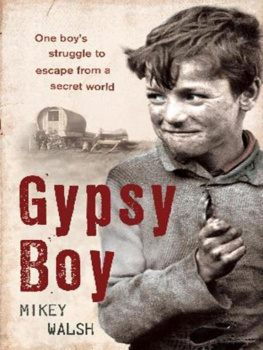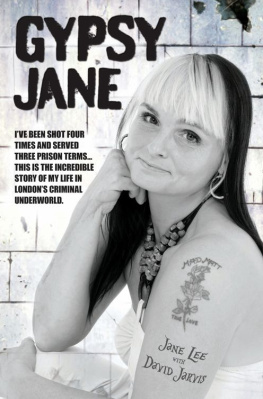
ACKNOWLEDGEMENTS
District VIII has been many years in the making. I have written about Hungary and its neighbours in Central Europe and the Balkans since the change of system in the early 1990s. I have always been fascinated by the Roma and the near parallel universe in which many live, alongside wider society but not fully part of it, and by the fierce bonds of family and blood that unite them against a frequently hostile outside world.
Too often the stories I wrote were about exclusion: a wall in the Czech Republic to separate Roma people from their neighbours, heart-rending accounts of young Roma women sterilised against their will in Slovakia, Roma settlements with no running water, sewage system or electricity. But there is also good news, as a new generation passes through the education system and finds its voice as activists, politicians or simply in the professions, including the police. I was glad to attend an event several years ago at the British embassy in Budapest in support of the Hungarian Roma Police Union.
As well as my own experience I drew on several books: I Met Lucky People, by Yaron Matras, is a lively and informative guide to Roma life and history, while Bury Me Standing by Isabel Fonseca, is an evocative journey through the world of the Roma. The European Roma Rights Centre, in Budapest (www.errc.org), is a valuable source of reports and analyses on Roma life. I am grateful to all those who shared their insider knowledge of Roma society, Budapests police and underworld.
My thanks go to my agents, Georgina Capel and Simon Shaps, for their steadfast support and for their belief in Balthazar Kovacs and District VIII. It has been a pleasure to work with the team at Head of Zeus: Nicolas Cheetham, Sophie Robinson, Clmence Jacquinet, Jessie Price, Blake Brooks and Louis Greenberg. Thanks also to Val McDermid and Andrew Taylor, my tutors on a crime-writing course at the Arvon Foundation, who strongly encouraged me to write what would become District VIII. I am especially grateful to the Society of Authors for a generous grant from the Authors Foundation. Thanks to Tamas Varga, Kitti Horvath and everyone at Central Gym in Budapest for lessons in various Krav Maga techniques which helped add realism to the books fight scenes. Clive Rumbold, a diligent reader and astute critic, read an early draft and made several helpful suggestions. A number of other friends helped along the way, especially Justin Leighton, Roger Boyes, Nick Thorpe, Pablo Gorondi and Peter Green, who accompanied me on several reporting trips in central Europe. My thanks most of all, to my ever supportive, patient and loving family: Kati, Danny, Hannah and my brother Jason.
Also by Adam LeBor
FICTION
Yael Azoulay thriller series
The Reykjavik Assignment
The Washington Stratagem
The Geneva Option
The Istanbul Exchange (short story)
*
The Budapest Protocol
NON-FICTION
City of Oranges
Tower of Basel
The Believers
Complicity with Evil
Milosevic: A Biography
Surviving Hitler (with Roger Boyes)
Hitlers Secret Bankers
A Heart Turned East
DISTRICT VIII
Pegasus Books Ltd
148 West37th Street, 13th Floor
New York, NY 10018
Copyright 2018 by Adam LeBor
First Pegasus Books hardcover edition June 2018
All rights reserved. No part of this book may be reproduced
in whole or in part without written permission from the publisher,
except by reviewers who may quote brief excerpts in connection with a review
in a newspaper, magazine, or electronic publication; nor may any part of this
book be reproduced, stored in a retrieval system, or transmitted in any form or
by any means electronic, mechanical, photocopying, recording, or
other, without written permission from the publisher.
ISBN: 978-1-68177-734-4
ISBN: 978-1-68177-817-4 (e-book)
Distributed by W. W. Norton & Company, Inc.
In memory of my father, Maurice LeBor,
a lover of Budapest.
You cannot walk in a straight line when the road is bent
Gypsy proverb
PROLOGUE
Keleti Station, 6.05 a.m., Friday, 4 September 2015
He lay on his back, his sleeping bag tangled between his legs, the nylon damp against his skin. A loudspeaker crackled for several seconds, paused, fired a long burst of jumbled vowels and consonants, fell silent again. His mouth was thick and dry, his T-shirt drenched with sweat. Where was he?
He turned on his side, looked around and remembered. A thin-faced boy, twelve or thirteen years old, was curled up under a brown acrylic blanket, his dirt-stained hand holding a torn backpack. A mother and baby lay on a sheet of corrugated cardboard at his feet. The child whimpered softly while the mother snored, oblivious, her chubby features serene in her sleep.
Simon Nazir rested his hand on his wifes back, felt her chest rise and fall, slid his fingers through her black, curly hair, felt the warmth of her skin against his, and closed his eyes. In his head he was still in Aleppo: he could hear the laughter of the shopkeepers in the bazaar, the siren call of the muezzin, smell the ancient dust, coffee and cardamom. He breathed in through his nose. The warm bovine reek almost made him gag. He opened his eyes, reached for his bottle of water and took a deep draught. The drink was stale and tasted of plastic. The sun was already up and the turquoise sky, streaked with fine white clouds, was about to deliver another day of heat and dirt and waiting.
Nazir tried in vain to get more comfortable, to stretch out without banging into another prone body. The human tide spread in every direction, filling the plaza in front of Keleti Stations main entrance, spilling along the sides. A busy intersection in a European capital was now a giant open-air refugee camp. The ground was covered with discarded food wrappers, cigarette ends, half-eaten sandwiches, rotten fruit, empty bottles of spring water, pairs of shoes taken off for the night. The lucky ones had tents, donated by tourists and music fans who had attended Budapests Sziget Festival a couple of weeks earlier in mid-August. Half a dozen white vans were spread among the sleeping crowd, television network names emblazoned on their doors, giant antennae and satellite dishes pointing skywards. It was too early for the journalists but by ten oclock there would be dozens of reporters here. Nazir watched a middle-aged man, an engineer he knew from home, twitch in his sleep, his arm around his ten-year-old daughter, a small suitcase in front of them.
The robo-voice was still droning in the background the Hungarian language station announcements were a constant backdrop but human sounds had pierced his sleep. A voice that he knew, one that he never wanted to hear again. Nazir glanced rightwards. Twenty yards or so away, there was movement, a male crouched, muttering.
Nazir told himself not to panic; to be calm, collected, clever. He was safe here. He was surrounded by people, police, reporters were coming. Nothing bad could happen, except more long days in transit. He and Maryam had been stuck at Keleti Station for five days, a halt in a journey that had lasted three weeks. They had fled Aleppo at night, crossing the frontlines, taken a taxi to Damascus, another to Beirut, flown to Istanbul, then travelled overland by bus and foot through Bulgaria, Serbia and Hungary.
And here at least, nobody was trying to gas or shoot them, or even arrest them. They had made it to Europe, not quite the west, but certainly central Europe. The terminuss yellow paint was fading, its waiting room was dark and gloomy, its roof cracked. But Keleti was still a symbol of empire, and Budapests place at the heart of the continent. A couple of days ago, he and Maryam had spent an hour staring at the departure board, dreaming of a new life in the west. On a normal day trains left here for Berlin, Vienna, Paris, Munich. But these were not normal times. Twenty-four hours ago the government had closed the western border to the migrants. All international trains were cancelled, although the local lines were still running. That didnt matter to the migrants, as they were not even allowed inside the station building. A line of riot police stood in front of the entrance. Every few minutes they moved aside to let the early morning commuters through, then stepped back into place, their arms crossed, their faces impassive.
Next page
